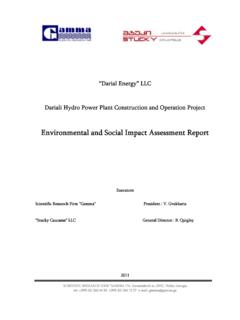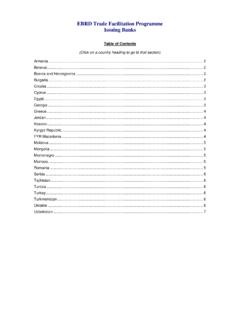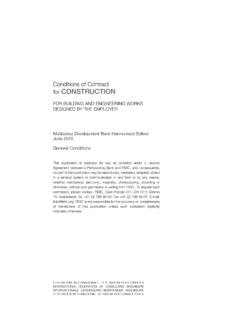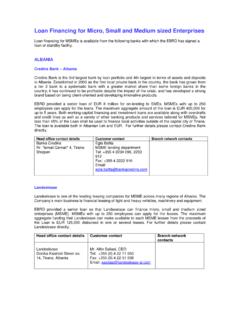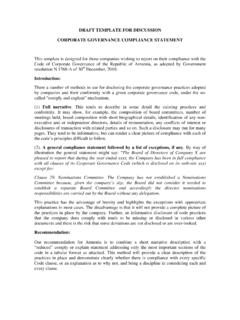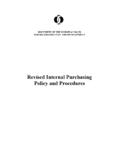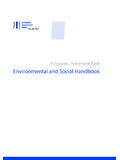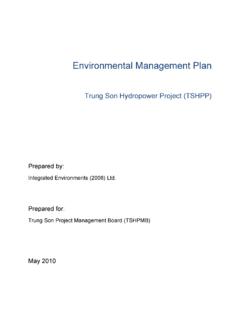Transcription of Environmental and Social Policy - ebrd.com
1 Environmental and Social Policy May 2008 ForewordThe European Bank for Reconstruction and Development (EBRD) adopted its first Environmental Policy in 1991 at the initial meeting of its Board of Directors. The scope of the Policy has evolved over time and it is now an Environmental and Social Policy . The Policy and related Performance Requirements were approved by the EBRD Board of Directors on 12 May 2008 and will take effect from 12 November 2008. The Policy details the commitments of the Bank s Founding Agreement to promote in the full range of its activities, environmentally sound and sustainable development. Environmental and Social Policy 1 Table of contentsEnvironmental and Social Policy A. Purpose of this Policy ..2B. EBRD s commitment .. 2C. Integrating Environmental and Social considerations into the project cycle: EBRD s role and responsibilities.
2 5D. EBRD public reporting and accountability .. 9E. Promoting investments with high Environmental and Social benefits, including working in partnership with others .. 10F. Country and sector strategies .. 11G. Institutional and implementation arrangements .. 11 Appendix 1: Category A projects .. 12 Appendix 2: EBRD Environmental and Social Exclusion list ..14 Performance Requirements PR 1: Environmental and Social Appraisal and Management .. 15PR 2: Labour and Working Conditions .. 22PR 3: Pollution Prevention and Abatement .. 26PR 4: Community Health, Safety and Security .. 30PR 5: Land Acquisition, Involuntary Resettlement and Economic Displacement ..34PR 6: Biodiversity Conservation and Sustainable Management of Living Natural Resources .. 44PR 7: Indigenous Peoples .. 50PR 8: Cultural Heritage.
3 58PR 9: Financial Intermediaries ..62PR 10: Information Disclosure and Stakeholder Engagement .. 68 2 Environmental and Social Policy 1 See Article (vii) of the Agreement Establishing In this Policy , the terms the EBRD and the Bank are used The text of the European Principles for the Environment (EPE) can be found at: The EPE is an initiative launched in response to the drive for increased harmonisation of Environmental principles, practices and standards associated with the financing of projects. The EPE are defined as the guiding Environmental principles in the EC Treaty and the practices and standards incorporated in EU secondary legislation. The EPE commitments are reflected in PRs 1, 2, 3, 4 and 10. A. Purpose of this Policy1. The EBRD is committed to promoting environmentally sound and sustainable development in the full range of its investment and technical cooperation activities pursuant to its constituent treaty, the Agreement Establishing the The Bank2 believes that sustainable development is a fundamental aspect of sound business management.
4 Therefore, EBRD s mandate to foster transition to market-based economies and promote private entrepreneurship, and its commitment to sustainable development are inextricably linked. All EBRD-financed projects shall meet the Bank s core operating principles of additionality, transition impact and sound banking. In addition, the Bank recognises that financing sustainable development must rank among the highest priorities of the EBRD s activities. 2. This Policy covers the Environmental and Social dimensions of sustainable development. For the purposes of this Policy , the Social dimension encompasses (i) labour standards and working conditions including occupational health and safety and (ii) community impacts such as public health, safety and security, gender equality, impacts on Indigenous Peoples and cultural heritage, involuntary resettlement, and affordability of basic services.
5 The Policy outlines how the Bank will put into practice its commitment to promote Environmental and Social sustainability by:mainstreaming of Environmental and Social considerations into all its activitiesestablishing for clients the Environmental and Social performance requirements that they will be expected to meet in a time frame acceptable to the Bankdefining the respective roles and responsibilities of both the EBRD and its clients in achieving sustainable outcomes in line with the Policy and the performance requirementssetting a strategic goal to promote projects with high Environmental and Social EBRD s commitment3. The EBRD will seek to ensure through its Environmental and Social appraisal and monitoring processes that the projects it finances: are socially and environmentally sustainable respect the rights of affected workers and communitiesand are designed and operated in compliance with applicable regulatory requirements and good international practice.
6 In order to translate this objective into successful practical outcomes, the Bank has adopted a comprehensive set of specific Performance Requirements ( PRs ) that clients are expected to meet, covering key areas of Environmental and Social impacts and issues. The Bank is committed to promoting European Union (EU) Environmental standards as well as the European Principles for the Environment, to which it is a signatory, which is reflected in the The Bank expects clients to assess and EBRD Environmental and Social Policy Environmental and Social Policy 34 For the purpose of this Policy , the Bank will not be considered to have a financial interest in a project where it has sold or exited from its investment (debt or equity) on deferred payment The transition impact of projects is assessed by the Bank s Office of the Chief Economist (OCE).
7 See for more The Bank has specific requirements related to good governance, money laundering, bribery and corruption, revenue transparency and disclosure of tariffs which are described in other Bank Policy the Environmental and Social issues associated with their projects so that projects meet the PRs. The Bank s role is: (i) to review the clients assessment; (ii) to assist clients in developing appropriate and efficient measures to avoid or, where this is not possible, minimise, mitigate or offset, or compensate for adverse Social and Environmental impacts consistent with the PRs; (iii) to help identify opportunities for additional Environmental or Social benefits; and (iv) to monitor the projects compliance with its Environmental and Social covenants as long as the Bank maintains a financial interest in the 4.
8 The Bank will enhance the assessment of transition impact of proposed projects5 to more explicitly reflect the systemic sustainable development dimension of transition and the benefits of a strategic approach in this area. Any EBRD-financed projects in pursuit of sustainable development objectives will be fully consistent with the Bank s transition The Bank will seek to finance projects that have the potential to realise additional Environmental and Social benefits, such as socio-economic benefits to project-affected communities and, where appropriate and feasible, equitable access amongst project- affected parties to those benefits. Particular attention will be given to projects which include elements that focus upon priority Environmental and Social issues facing the region and which promote implementation of relevant EU strategies, such as climate change mitigation and adaptation, desertification, biodiversity conservation, energy and resource efficiency, poverty alleviation, promotion of decent work, reducing Social exclusion, access to basic services, gender equality, transparency, and Social development.
9 The EBRD will also consider whether proposed projects can be expected to contribute to the development of the host country and to broadly benefit project-affected communities in economic, Social , or Environmental terms. The EBRD will build partnerships with clients to assist them in adding value to their activities, improve long-term sustainability and strengthen their Environmental and Social management capacity. 6. The Bank recognises the importance of climate change mitigation and adaptation and their high priority for the Bank s activities in the region. It intends to further develop its approach towards climate change, notably as regards the reduction of greenhouse gases, adaptation, promotion of renewables and improvement of energy efficiency, in view of strengthening the treatment of these elements in its The EBRD is strongly committed to the principles of corporate transparency,6 accountability and stakeholder engagement.
10 It will disclose, on an ongoing basis, information about the Bank s performance on Environmental and Social issues and will engage in meaningful dialogue with the Bank s community of stakeholders. The Bank will promote similar good practices amongst its clients. In particular, the EBRD expects clients to identify and interact with their stakeholders on an ongoing basis, and to engage with potentially affected communities through disclosure of information, consultation, and informed participation in a manner deemed by the Bank to be commensurate to the impacts associated with the project. Such stakeholder interaction should be consistent with the spirit, purpose and ultimate goals of the United Nations Economic Commission for Europe (UNECE) Convention on Access to Information, 4 Environmental and Social Policy 7 Aarhus Convention : Espoo Convention : Internationally agreed instruments related to corporate responsibility include the International Labour Organisation (ILO) Tripartite Declaration of Principles concerning Multinational Enterprises and Social Policy , and the Organisation for Economic Co-operation and Development (OECD) Guidelines for Multinational Enterprises.
